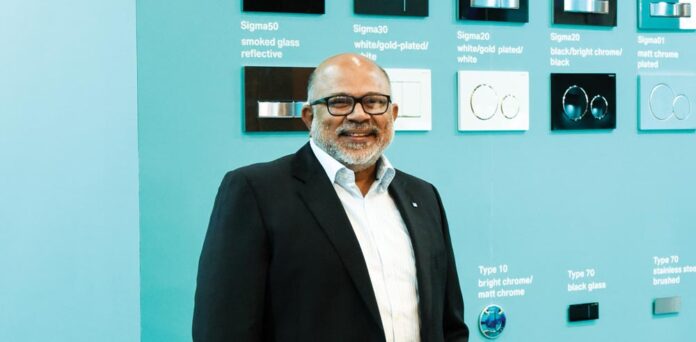The company is gradually increasing its product portfolio in India
By Gyanendra Kumar Kashyap
This summer will see the emergence of Geberit India as a B2C marketer, as it rolls out a series of premium and high technology products in the sanitaryware segment. The company has already launched AquaClean Mera and Sela WCs, and the Preda and Selva urinal series, both of which were presented at ISH India. Till now the company, a subsidiary of Germany’s Geberit Group, has been active in sanitary technology which is primarily used in behind-the-wall applications.
In an exclusive interaction with Sourcing Hardware, Geberit India managing director Abubaker Koya spoke at length about the company’s new products and evolving strategy for the Indian market. “The AquaClean Mera shower toilets offer a whole new level of comfort with their sophisticated technology and stylish design complementing each other perfectly to create a masterpiece of function and design.” He added that while Geberit was primarily in the behind-the-wall segment, with the recent acquisition of global ceramic brands including Twyford and Keramag, it is gradually coming into the front of the wall segment. The new products are priced in the `3-5 lakh bracket and will be available at premium stores starting April.
Koya stressed that while the initial focus of Geberit India had been on concealed cisterns, today it has a strong foothold in the premium piping/drainage business, particularly among institutional buyers and developers. “In the piping business, we are into HDPE as opposed PVC, as HDPE provides for highly efficient, leak-proof drainage systems. On the pricing front HDPE pipes cost twice as much as PVC but prove to be more effective when it comes to high rise applications (30 floors and above), where engineering challenges abound,” he said. “These high rise buildings need special plumbing technology and Geberit being a specialist, is able to provide it. In Mumbai there are 150 projects that have over 40 floors and Geberit accounts for 60% of them.”
Sharing the India strategy, Koya said the company started with concealed flushing systems, set up a manufacturing unit in Pune in 2012, graduated to piping systems, and is now getting into pre-fabricated toilets. “We are increasing our footfall from one product to the other. Geberit India is coming up with public toilets and high end ceramics,” he said, adding that these products will not be manufactured in India, but will be imported. Geberit is targeting the organised builders who are adopting new technologies, a market segment that is growing fast. A key global trend, he added, that is gaining ground in the country is installation of pre-fabricated toilet blocks, largely due to constraints related to skilled labour and time.
“There will be two levels of growth for us, new construction-led growth and the renovation-led growth.” Commenting on the market potential, Koya said that while Europe is largely a renovation market, the markets in Asia are being driven by new demand, with 25-30% annual growth potential for premium sanitary products. “For brands which can package technology with competitive prices, the potential is huge. All our products will be price-competitive in their respective categories,” he added.
Koya does not rule out the possibility of adopting the acquisition strategy in the Indian context, which Geberit has successfully used in Europe to gain market share. India is a high-volume-low-margin market, and any global player looking to scale up in this market will be hard pressed to consider the acquisition route. “For Geberit, acquisitions are part of our global strategy, as it gives scale and reach.”
At Geberit, product development is based on solid market expertise and latest technology, claimed Koya. “We place particular emphasis on the quality and efficiency of our research and development. That is what enables us to secure market leadership and set trends with our sanitary products,” he said. As a matter of fact Geberit spends 2.5% of its turnover on research and development. “Being a technology solutions provider, our investment has been in technology transfer,” he said, adding that in the last five years the company has filed 100 patents, and showcases its innovative products regularly at ISH Germany. “The company’s eco-system is such that it promotes innovation.”
Sharing his thoughts on the need to build a skilled workforce, Koya said Geberit has helped establish a first-of-its-kind plumbing lab at Pune University, and is working with institutions to create customised learning and knowledge sharing programmes. “On the lines of what we have established at Pune University, we are in talks with JJ Institute in Mumbai, IIT Delhi, and with skill sector councils in Delhi and Kerala. The lab prototype calls for investments to the tune of `30-40 lakh. Besides we also train plumbers, almost 5,000 a year.”

